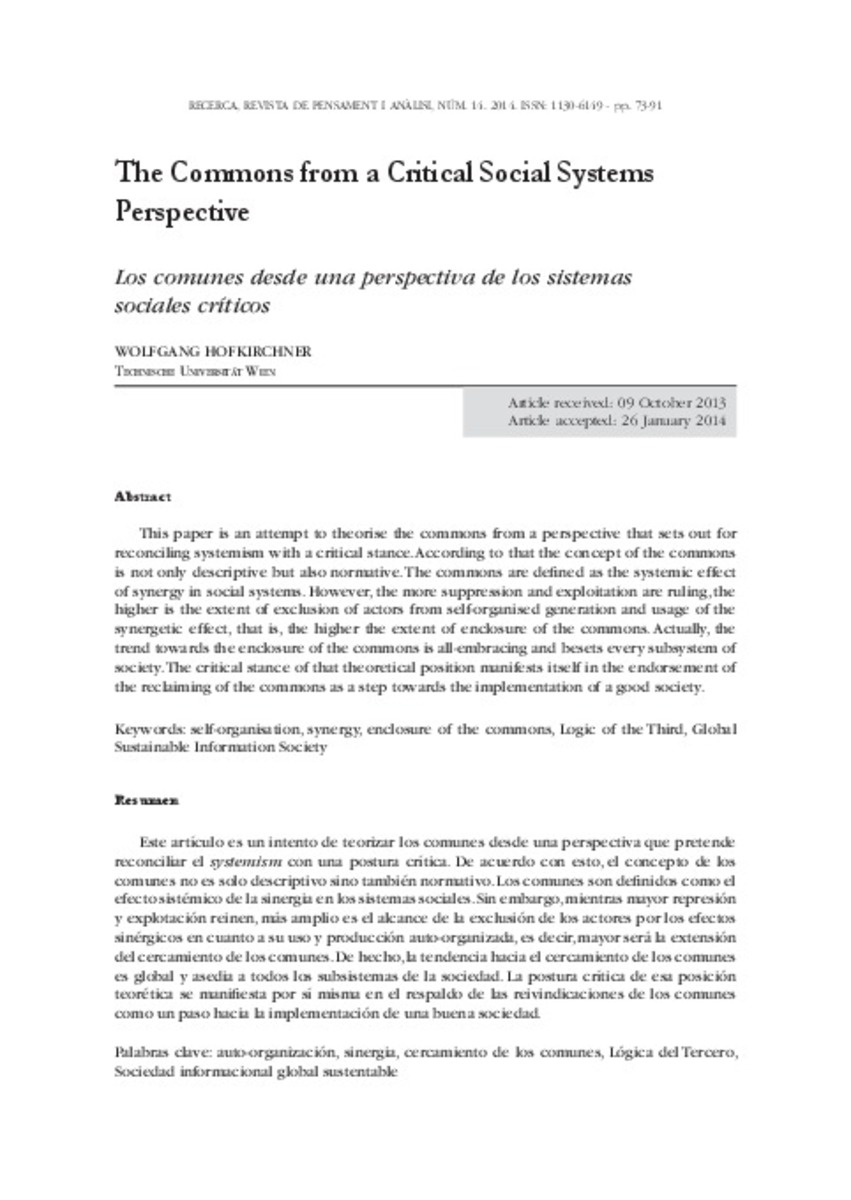Mostra el registre parcial de l'element
The Commons from a Critical Social Systems Perspective
| dc.contributor.author | Hofkirchner, Wolfgang | |
| dc.date.accessioned | 2014-10-08T07:39:24Z | |
| dc.date.available | 2014-10-08T07:39:24Z | |
| dc.date.issued | 2014 | |
| dc.identifier.issn | 1130-6149 | |
| dc.identifier.issn | 2254-4135 | |
| dc.identifier.uri | http://hdl.handle.net/10234/105175 | |
| dc.description.abstract | This paper is an attempt to theorise the commons from a perspective that sets out for reconciling systemism with a critical stance. According to that the concept of the commons is not only descriptive but also normative. The commons are defined as the systemic effect of synergy in social systems. However, the more suppression and exploitation are ruling, the higher is the extent of exclusion of actors from self-organised generation and usage of the synergetic effect, that is, the higher the extent of enclosure of the commons. Actually, the trend towards the enclosure of the commons is all-embracing and besets every subsystem of society. The critical stance of that theoretical position manifests itself in the endorsement of the reclaiming of the commons as a step towards the implementation of a good society. | ca_CA |
| dc.description.abstract | Este artículo es un intento de teorizar los comunes desde una perspectiva que pretende reconciliar el systemism con una postura crítica. De acuerdo con esto, el concepto de los comunes no es solo descriptivo sino también normativo. Los comunes son definidos como el efecto sistémico de la sinergia en los sistemas sociales. Sin embargo, mientras mayor represión y explotación reinen, más amplio es el alcance de la exclusión de los actores por los efectos sinérgicos en cuanto a su uso y producción auto-organizada, es decir, mayor será la extensión del cercamiento de los comunes. De hecho, la tendencia hacia el cercamiento de los comunes es global y asedia a todos los subsistemas de la sociedad. La postura crítica de esa posición teorética se manifiesta por sí misma en el respaldo de las reivindicaciones de los comunes como un paso hacia la implementación de una buena sociedad. | ca_CA |
| dc.format.extent | 19 p. | ca_CA |
| dc.format.mimetype | application/pdf | ca_CA |
| dc.language.iso | eng | ca_CA |
| dc.publisher | Universitat Jaume I. Departament de Filosofia i Sociologia | ca_CA |
| dc.relation.isPartOf | Recerca: revista de pensament i anàlisi; Núm.: 14 | ca_CA |
| dc.rights.uri | http://creativecommons.org/licenses/by-sa/4.0/ | * |
| dc.subject | History | ca_CA |
| dc.subject | Philosophy | ca_CA |
| dc.subject | Humanitats -- Revistes | ca_CA |
| dc.subject | Educació -- Revistes | ca_CA |
| dc.subject | Filosofia -- Revistes | ca_CA |
| dc.subject | Sociologia -- Revistes | ca_CA |
| dc.subject | self-organisation | ca_CA |
| dc.subject | synergy | ca_CA |
| dc.subject | enclosure of the commons | ca_CA |
| dc.subject | Logic of the Third | ca_CA |
| dc.subject | Global Sustainable Information Society | ca_CA |
| dc.subject | auto-organización | ca_CA |
| dc.subject | sinergia | ca_CA |
| dc.subject | cercamiento de los comunes | ca_CA |
| dc.subject | Lógica del Tercero | ca_CA |
| dc.subject | Sociedad informacional global sustentable | ca_CA |
| dc.title | The Commons from a Critical Social Systems Perspective | ca_CA |
| dc.title.alternative | Los comunes desde una perspectiva de los sistemas sociales críticos | ca_CA |
| dc.type | info:eu-repo/semantics/article | ca_CA |
| dc.identifier.doi | http://dx.doi.org/10.6035/Recerca14.4 | |
| dc.rights.accessRights | info:eu-repo/semantics/openAccess | ca_CA |
Fitxers en aquest element
Aquest element apareix en la col·lecció o col·leccions següent(s)
-
Recerca_2014_núm.14 [10]








